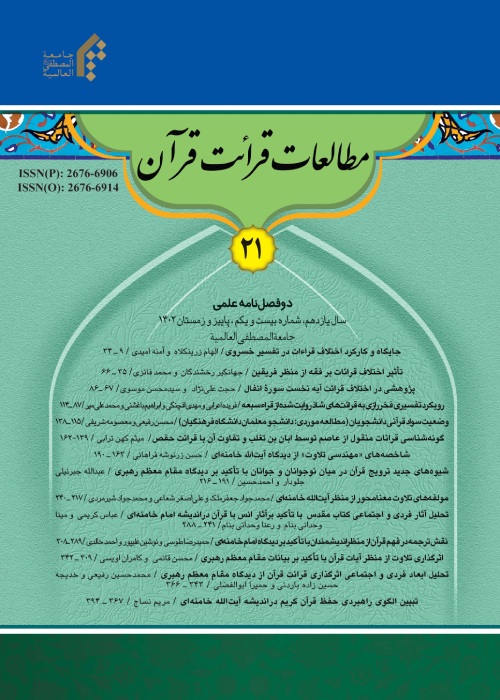THE ROLE OF DIFFERENCE OF RECITATION IN THE INTERPRETATION OF THE VERSE "CREATED HIM, THEN GUIDED"
The verse {He said, Our Lord is He who gave everything its creation, then guided it} (Taha / 50) is one of the key verses of the Qur'an in the field of ‘Tawhid al-Ruboubi’ [monotheism in terms of Ruboubiyyet]. The correct interpretation of this verse, like any other verse, depends on attaching to and mastering the rules of interpretation. One of the necessary sciences for interpretation is "the science of reciting the Qur'an", which plays an important role in interpretive interpretations.In this research, with a descriptive-analytical method, an attempt has been made to clarify the role of differences in recitation in the interpretation of verse 50 of Surah Taha by examining the interpretive sources of the two sects. For this regard, the two famous and unpopular readings of the verse and the interpretive work of each have been compared, criticized and studied, and by relying on the arguments and criteria of critique of differences in readings, including literary rules and contexts, etc. as well as reviewing and applying the interpretations of both recitations, one of them is preferred or rejected. In this verse, there are two different readings (famous and unpopular) in the word "khalaqah" [created him]. As a result of these two readings, different combinations are considered for the verse, which also lead to different interpretations. Among these combinations, it is better in terms of the two objects of the verb "a’ta" [gave] in the verse, respectively. Among the meanings, considering the generality of the verse is more consistent with the context. Hence, these two readings are closely related to each other, which is reflected in their comparison in their interpretation. These include: validation of recitations, rejection of an interpretive commentary in unpopular recitation due to its incompatibility with famous recitation, preference of popular recitation over an unpopular one using the standard of Arabic literature, combination of interpretive meanings in both recitations, critique of misinterpretations in the development of both readings, expanding the meaning of the verse with different recitations and confirming an interpretive commentary in a certain recitation.
- حق عضویت دریافتی صرف حمایت از نشریات عضو و نگهداری، تکمیل و توسعه مگیران میشود.
- پرداخت حق اشتراک و دانلود مقالات اجازه بازنشر آن در سایر رسانههای چاپی و دیجیتال را به کاربر نمیدهد.


